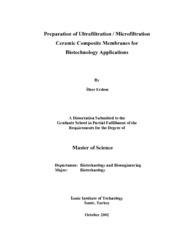Please use this identifier to cite or link to this item:
https://hdl.handle.net/11147/3716Full metadata record
| DC Field | Value | Language |
|---|---|---|
| dc.contributor.advisor | Çiftçioğlu, Muhsin | - |
| dc.contributor.author | Erdem, İlker | - |
| dc.date.accessioned | 2014-07-22T13:52:13Z | - |
| dc.date.available | 2014-07-22T13:52:13Z | - |
| dc.date.issued | 2002 | - |
| dc.identifier.uri | http://hdl.handle.net/11147/3716 | - |
| dc.description | Thesis (Master)--Izmir Institute of Technology, Biotechnology, Izmir, 2002 | en_US |
| dc.description | Includes bibliographical references (pages 54-58) | en_US |
| dc.description | Text in English; Abstract: Turkish and English | en_US |
| dc.description | xi, 58 leaves | en_US |
| dc.description.abstract | Ceramic membranes possess desirable properties for industrial separation and concentration processes where extreme conditions of heat, pH, ionic strength are present. Ceramic composite membranes consisting of a support and a thin membrane layer with finer pores were prepared in this work. Ceramic supports were prepared from fine alumina and zirconia powders by dry-pressing and slipcasting.These supports were sintered in the 1100-1200°C temperature range.These supports were dip-coated with ceramic sols prepared from zirconium propoxide and aluminium isopropoxide for the preparation of thin layers with finer pores. Average particle sizes of these sols were measured as 3-7 nm for zirconia sol and 30-40 nm for alumina sol by laser scattering technique. The dipcoated membranes were calcined in the 500-600°C temperature range. The thermal characterization of membrane layers was determined with DTA/TGA. The microstructure of the ceramic composite membranes was investigated with SEM. The clean water permeability (CWP) of membranes was tested by using deionised water in a filtration set-up. Separation experiments were performed with bovine serum albumin (BSA, Stokes diameter: 7 nm) solution and whey to determine protein separation capacity of the composite membranes. The CWP of the dry pressed alumina supports heat treated at 1100°C was found to be higher than the permeability of the slip-cast zirconia supports heat treated at 1200°C. The protein retention of the slip-cast zirconia support was detected as 60% with UVVIS spectrophotmeter analysis (Abs. at 280nm). After the modification of the support with dip-coating protein retention of 96% was achieved. Then the composite membranes were used in whey protein concentration experiments. Whey, which is a complex biological liquid, containing proteins, carbohydrate, minerals, was fed to the membrane without any clarification process. The retention of whey proteins with dry-pressed alumina support modified with 1/4 diluted zirconia sol (calcination temperature: 500°C) was found to be 96% with a permeate flux of 40 Lm-2hour-1. | en_US |
| dc.language.iso | en | en_US |
| dc.publisher | Izmir Institute of Technology | en_US |
| dc.rights | info:eu-repo/semantics/openAccess | en_US |
| dc.subject.lcc | TP248.25.M46 E73 2002 | en |
| dc.subject.lcsh | Membranes (Technology) | en |
| dc.subject.lcsh | Ceramic-matrix composites | en |
| dc.subject.lcsh | Ultrafiltration | en |
| dc.title | Preparation of Ultrafiltration/ Microfiltration Ceramic Composite Membranes for Biotechnology Applications | en_US |
| dc.type | Master Thesis | en_US |
| dc.institutionauthor | Erdem, İlker | - |
| dc.department | Thesis (Master)--İzmir Institute of Technology, Bioengineering | en_US |
| dc.relation.publicationcategory | Tez | en_US |
| dc.identifier.wosquality | N/A | - |
| dc.identifier.scopusquality | N/A | - |
| item.openairecristype | http://purl.org/coar/resource_type/c_18cf | - |
| item.languageiso639-1 | en | - |
| item.openairetype | Master Thesis | - |
| item.grantfulltext | open | - |
| item.fulltext | With Fulltext | - |
| item.cerifentitytype | Publications | - |
| Appears in Collections: | Master Degree / Yüksek Lisans Tezleri | |
Files in This Item:
| File | Description | Size | Format | |
|---|---|---|---|---|
| T000299.pdf | MasterThesis | 4.72 MB | Adobe PDF |  View/Open |
CORE Recommender
Page view(s)
236
checked on Mar 31, 2025
Download(s)
100
checked on Mar 31, 2025
Google ScholarTM
Check
Items in GCRIS Repository are protected by copyright, with all rights reserved, unless otherwise indicated.